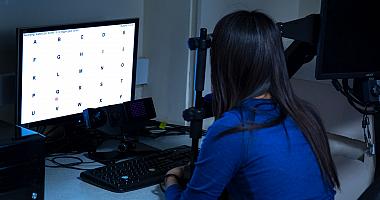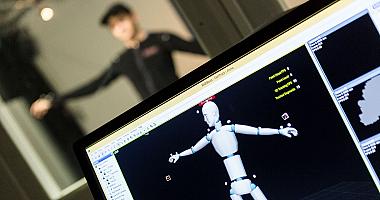BSc (Hons)
Psychology
Content navigation menu
Why study BSc Psychology at Goldsmiths
Our cutting-edge BSc Psychology offers a unique approach to the study of human behaviour. The degree will develop your understanding of the processes shaping how individuals think, feel, behave, and interact, via analysis of critical issues in contemporary psychology.
- Real-world relevance: You will analyse real-world issues through a bio-psycho-social model, connecting theory, research, policy, and practice. Themed teaching blocks will address critical topics including social justice, health and wellbeing, and artificial intelligence.
- Integrated research focus: The curriculum places a strong emphasis on research, equipping you with quantitative and qualitative research skills, integrated seamlessly with module content. You'll have access to our fantastic facilities. These include behavioural testing facilities, an EEG suite for brain research, an infant lab with state-of-the-art neuroimaging methods, virtual reality laboratories and a visual perception and attention laboratory.
- Empowered learning experience: We put community at the heart of your learning journey, using group activities, peer support, an academic mentor, and active engagement with the world-leading research of the department. You will develop your own bespoke curriculum through a combination of optional modules in your second and final years.
- Comprehensive preparation for diverse careers: Our contemporary and creative curriculum prepares you for a broad range of careers. You will develop transferable skills essential for graduate level employment. This degree is accredited by the British Psychological Society and gives you eligibility for Graduate Membership for Chartered Membership, which is required to study various postgraduate courses and to become a fully Chartered Psychologist.
Contact the department
If you have specific questions about the degree, contact Peter Holland.
UCAS code
C800
Entry requirements
A-level: BBB
BTEC: DDM
IB: 33 points overall with Three HL subjects at 655
Length
3 years full-time or 4 years full-time with a placement year
Fees
Home - full-time: £9250
International - full-time: £20840
Department
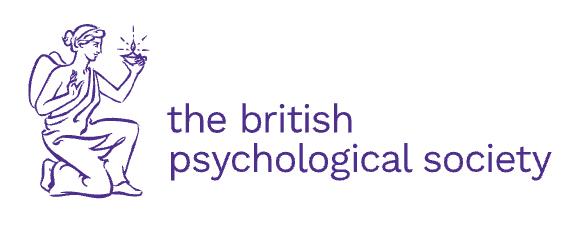
The degree is accredited by the British Psychological Society as conferring eligibility for Graduate Membership of the Society and also the Graduate Basis for Chartered Membership, which is the first step towards becoming a Chartered Psychologist.
I adore my department, I love how tight-knit it feels. I was surprised at how at home I feel here and it’s still just my second year – the amount I’ve learned so far is invaluable. I love the opportunities that have arisen from being an enthusiastic and open student.
Lara, BSc Psychology
What you'll study
Year 1 (credit level 4)
Learning will be structured across three interdisciplinary themes:
- Mental Health and Wellbeing
- Cognition and Culture
- Life and Society
Each theme is supplemented by integrated Research Methods training, and Personal and Professional Development.
Mental Health and Wellbeing
In the first term, we will explore the question ‘what does it mean to be well’, drawing on psychological theories and research. This incorporates contributors to wellbeing, including physical health such as stress and sleep, and social, cultural and environmental factors.
In the second term, we will explore the biological and neurological basis for wellbeing and mental health. There will be a particular focus on applying knowledge of brain development and function to common life experiences.
Cognition and Culture
In the first term, we explore what cognition is and how it is measured. We will explore how cognitive domains are applied in the context of human-computer interaction, talent in art and sports, policing, and political discourse. We will also consider how successfully cognitive science captures diverse cultural perspectives.
In the second term, we will explore neuroscientific and behavioural foundations of perception (vision, audition, touch, taste and smell), imagery, attention and action. We will place particular focus on studying these concepts from a neuropsychological and applied perspective, considering how our understanding of perception, attention and action can shed light on contemporary topics such as aesthetic experience and the arts, mindfulness, video gaming, cognitive enhancement and expert performance.
Life and Society
In the first term, we introduce the concept of the self, considering ourselves at the personal, interpersonal and societal levels. We explore relationships, intersectional identity, and individual differences, and reflect on and challenge our own experiences and intuitions, integrating these with theory and research to inform a scientific understanding of self.
In the second term, we focus on human development as a dynamic and interactionist process – a lifetime of learning from ourselves, others, and the wider environment. We take a developmental cognitive neuroscience perspective to inform our understanding of topics including neurodiversity, multilingualism, and healthy ageing.
Teaching style
Teaching in Years 1 and 2 occurs in themed blocks, with each theme consisting of a range of lectures, seminars, practicals, and small group/independent work. Terms 1 and 2 start with an introductory week, which emphasises community building and introduces core concepts relevant to the whole term.
How you'll be assessed
In Years 1 and 2, each theme will have diverse assessments that are designed to reflect multiple important skills for further study and future employment.
These will include writing assignments (eg case study, opinion piece, policy brief), group work assignments (eg running a small experiment), oral/interactive assignments (eg presentation to a small group, podcast), and written or oral exams (eg timed essay).
Credits and levels of learning
An undergraduate honours degree is made up of 360 credits – 120 at Level 4, 120 at Level 5 and 120 at Level 6. If you are a full-time student, you will usually take Level 4 modules in the first year, Level 5 in the second, and Level 6 modules in your final year.
Note about optional modules
The optional module list is indicative of the typical modules offered, but is not intended to be construed or relied on as a definitive list of what might be available in any given year. The module content and availability is subject to change.
Study routes
As well as this BSc Psychology degree, we offer these parallel streams of study should you wish to specialise in a particular area:
- BSc (Hons) Psychology with Clinical Psychology
- BSc (Hons) Psychology with Cognitive Neuroscience
- BSc (Hons) Psychology with Forensic Psychology
Professional placement
All Goldsmiths BSc Psychology degrees contain an optional placement year between the second and final year of study. You will be responsible for securing a placement, but we can support you through this process.
The industrial placement year is a great opportunity for you to gain work experience, build confidence and contacts, develop your skills and industry insight, and enhance your career prospects.
You'll be supported throughout your placement year by a placement tutor, who will provide you with guidance and liaison between you and your employer.
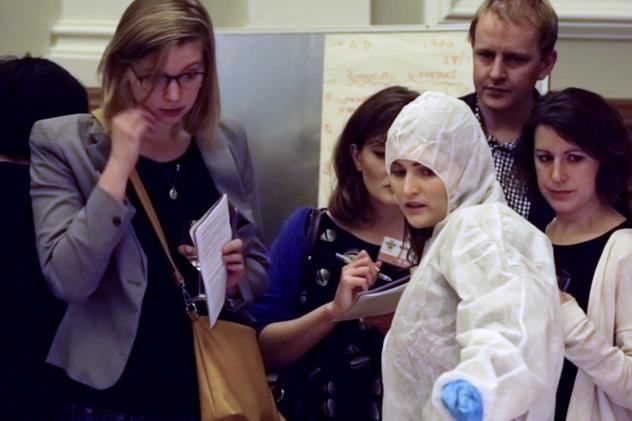
Many inspiring events take place on campus throughout the year, including immersive science-theatre events to share and gather research on areas such as eye-witness investigation and the interviewing of victims.
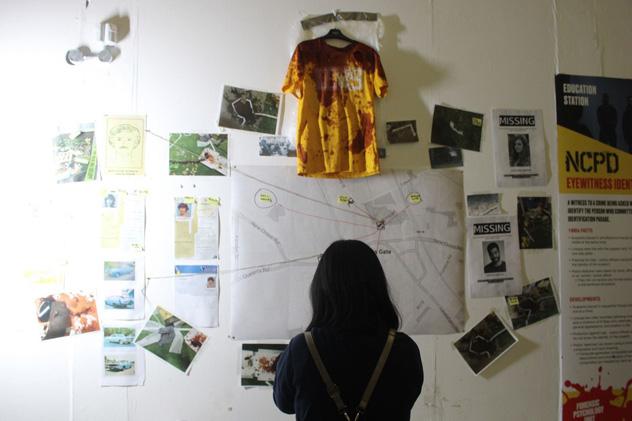
The recent 'NCPD' immersive event saw attendees travel back to the 1980s to become trainee detectives of New Cross Police Department and try to solve a murder that baffled professionals at the time.
Facilities and resources
The Department of Psychology has a wealth of specialist labs and facilities that enable students and academics to engage in cutting-edge research. Technologies include:
- Lab based and mobile electroencephalography (EEG)
- Functional near infra-red spectroscopy (fNIRS)
- Virtual reality headsets
- Eye trackers
- Transcranial magnetic stimulation (TMS) and transcranial electrical stimulation (TES)
- Biometric signal recording (eg heart rate, galvanic skin response)
- Licenses and specialist servers for online experiments
Bespoke testing spaces include:
- Forensic interview suite
- Behavioural testing cubicles
- InfantLab for developmental studies
- SleepLab
- Sound booth for auditory studies
Goldsmiths was unique – it blew my mind! The lecturers were very down-to-earth and supportive, and it was easy to make friends as everyone is really welcoming and warm.
Sarah, BSc Psychology graduate (Analyst, Bank of America)

Careers
Students from the BSc Psychology degree go on to a broad range of careers and future study in areas including:
- Clinical psychology
- Occupational psychology
- Market research
- Advertising
- Media psychology
- Criminal/forensic psychology
- Consultancy
- Research psychology
Some of the graduate-level jobs that Goldsmiths psychology graduates are working in include:
- Behavioural Mental Health Support Worker
- Brain Injury Recovery Worker
- Mental Health Mentor
- Community Recovery Support Worker
- Lab Manager
- Business Analyst
- Marketing Manager
Our graduates work in a wide range of settings from schools to hospitals, from broadcasting to banks, and in both private and public sector jobs. You can find out more about career options after graduating on our psychology careers page.
The programme is accredited by the British Psychological Society (BPS), which means that alumni are eligible for graduate basis for Chartership with the BPS – vital if you want a career as a psychologist in the future.
Skills
Throughout the degree you will receive a thorough training in:
- The design and evaluation of empirical research
- Statistical analysis
- Hands-on lab skills
- The use of specialist psychology-relevant software
In addition, you'll develop the following transferable skills:
- Critical thinking and analytical skills
- The ability to look at issues from different perspectives
- Data and information processing skills
- Reflection skills
- Self motivation
- Planning and organisation skills
- Oral and written communication skills
Skills and employability training
The Department of Psychology has its own Skills and Employability Programme for students, starting in the first term with a full first-year course on the topic. We are keen that you understand what kind of transferable skills you will develop during the BSc Psychology degree, and how you can make the best impression on future employers.
We have strong links with employers of psychology graduates, and the programme has been set up to support you to actively seek relevant work knowledge and experience. This experience can help you develop and recognise the professional-level skills that are highly sought after in the job market.
Professional placement
If you decide on the professional placement route, you will develop the practical skills and real-world work experience that is sought after by employers.
Entry requirements
We accept the following qualifications:
A-level: BBB
BTEC: DDM
International Baccalaureate: 33 points overall with Three HL subjects at 655
Access: Pass with 45 Level 3 credits including 30 Distinctions and a number of merits/passes in subject-specific modules
Scottish qualifications: BBBBC (Higher) or BBC (Advanced Higher)
European Baccalaureate: 75%
Irish Leaving Certificate: H2 H2 H2 H2
Additional requirements
You should normally have at least Grade B/Grade 6 in GCSE (or equivalent) in Mathematics or Statistics, and English.
International qualifications
We also accept a wide range of international qualifications. Find out more about the qualifications we accept from around the world.
If English isn’t your first language, you will need an IELTS score (or equivalent English language qualification) of 6.0 with a 6.0 in writing and no element lower than 5.5 to study this programme. If you need assistance with your English language, we offer a range of courses that can help prepare you for degree-level study.
Alternative qualifications and experience
See our full list of undergraduate entry qualifications.
We exercise flexibility where entry requirements are concerned, and make offers based on your enthusiasm and commitment to your subject, as shown by your application and personal statement, qualifications, experience and reference.
Your referees are welcome to include any relevant contextual comments around your academic achievements. We’ll look at all these things when making a decision on your application, as well as your qualifications and grades.
We frequently interview mature applicants (over 21) or those with alternative qualifications, and have a long tradition of encouraging students from all social backgrounds to study at our university.
Fees and funding
Annual tuition fees
These are the UG fees for students starting their programme in the 2024/2025 academic year.
- Home - full-time: £9250
- International - full-time: £20840
If your fees are not listed here, please check our undergraduate fees guidance or contact the Fees Office, who can also advise you about how to pay your fees.
It’s not currently possible for international students to study part-time if you require a Student Visa, however this is currently being reviewed and will be confirmed in the new year. Please read our visa guidance in the interim for more information. If you think you might be eligible to study part-time while being on another visa type, please contact our Admissions Team for more information.
If you are looking to pay your fees please see our guide to making a payment.
Funding opportunities
We offer a wide range of scholarships and bursaries, and our Careers Service can also offer advice on finding work during your studies. Find out more about funding your studies with us.
Additional costs
In addition to your tuition fees, you'll be responsible for any additional costs associated with your course, such as buying stationery and paying for photocopying. You can find out more about what you need to budget for on our study costs page.
There may also be specific additional costs associated with your programme. This can include things like paying for field trips or specialist materials for your assignments. Please check the programme specification for more information.
Professor Rebecca Charlton discusses her research on ageing, looking at adults recently diagnosed with autism spectrum disorder.




